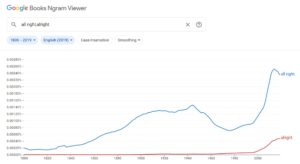. . .IF you are a lazy, subliterate “Dunning-Krugerand.”
Read a book where a lazy, subliterate “Dunning-Krugerand” writer committed a LOT (No, more than what you think of as “a lot,” MUCH more) of usage errors, on top of other basic grammar and orthography errors, including using “squib” (yes, with a “b”) to refer to a couple of retired Navy characters. No. I tired of typing,
“#GAGAMAGGOT!!!! SQUID, you subliterate “Dunning-Krugerand” moron, SQUID!” and so intend to include something like this in an Amazon review (though I’ll include other examples of evidence that no literate eye gave a glance at the book before it was published):
“squib:
noun
a small firework consisting of a tube filled with powder that makes a hissing noise when it is lit”
https://dictionary.cambridge.org/dictionary/english/squib
Also, re: firearms:
https://en.wikipedia.org/wiki/Squib_load
“A squib load, also known as a squib round, pop and no kick, or just a squib, is a firearm malfunction in which a fired projectile does not have enough force behind it to exit the barrel, and thus becomes stuck.”
SQUID, OTOH,
What Is A Navy Squid? 11 Slang Nicknames For Navy Sailors
“A term used in the old Navy (not the store), Squid is what other branches
(especially Marines) generally called sailors.”
Writers who do not care enough about their craft and who have no respect whatsoever for those they expect to pay for their “work,” and who therefore see no need to become literate are just wannabe thieves, seeking to steal $$ from readers for NOT doing their work, and to steal time better used to read or do other things. Note to wannabe writers: unless you can at least pass an “English as a second language” course, just write in your native tongue (for those who grew up in an English speaking milieu, that might well be gibberish. Very well, write your gibberish openly so that literate folks can more easily avoid it. Thankfully, many subliterate self-pubs write their own book blurbs. . . ).
I don’t want to be mean, but. . . “He MADE me do it!” *heh*
Another example, this one a whole sentence, illustrates a different frustration I experience with “Dunnig-Krugerite” writers.
“The palace is more than a thousand years old, [and was] once a stop for traders from the Silk Road.”
So, it was once a caravansaral (caravanari, caravanserai, caravansary). Would have been easier to just use the right word, viz., “. . .once a caravansaral on the Silk Road.” Oh, but wait. That would assume that both the writer and his intended audience had a working vocabulary larger than the typical fifth grader.


